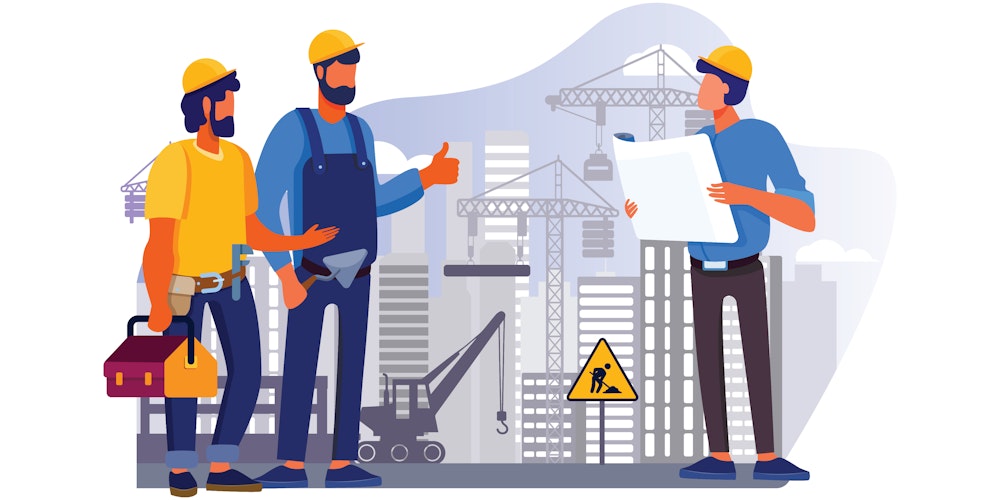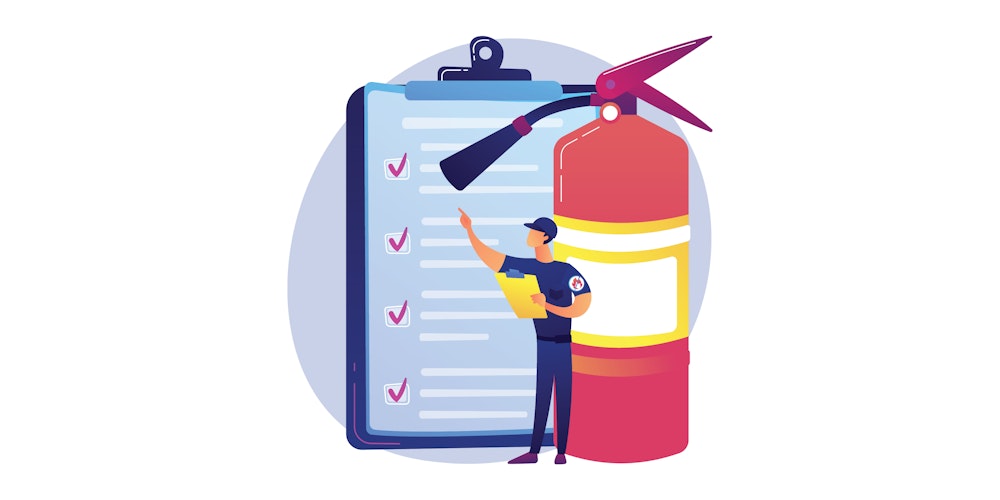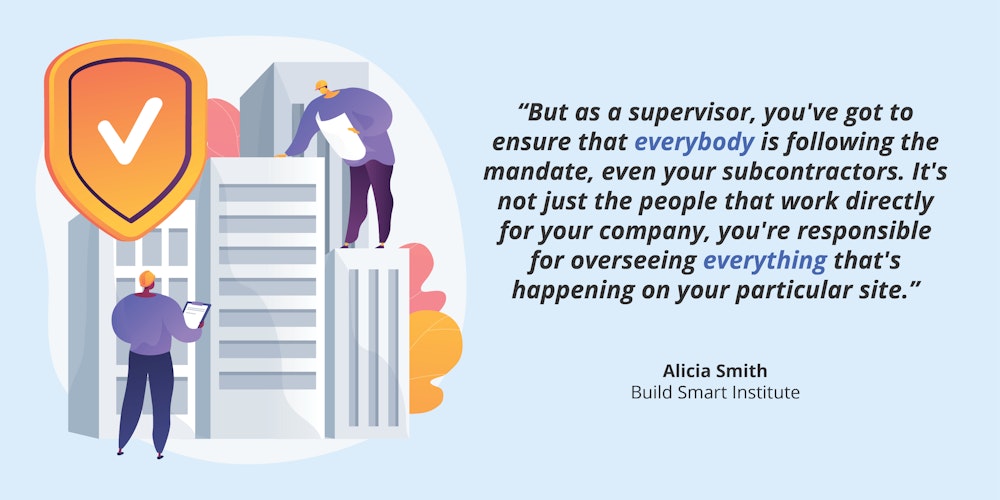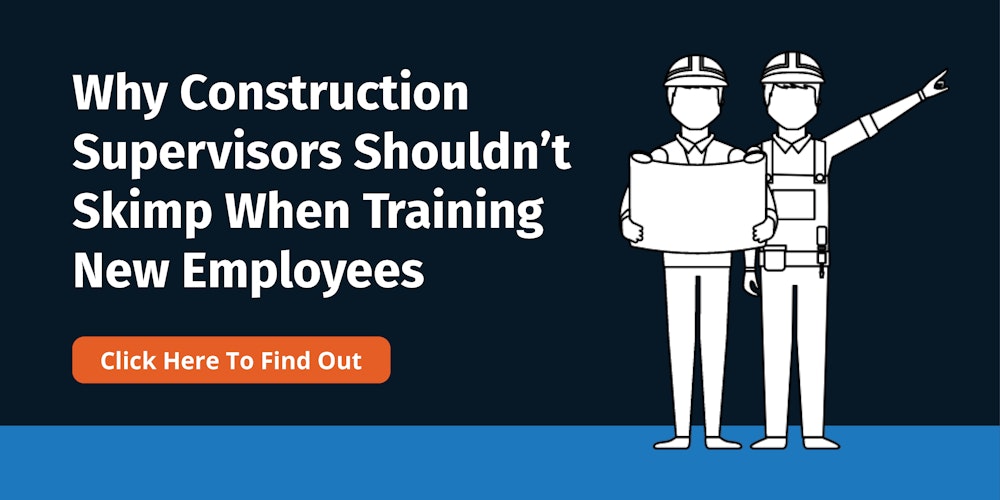If you’re a construction worker and you want to further your career, becoming a field supervisor might be a great next-step for you.
But how can you be sure?
Ideally, you need to understand what the job entails and find out whether or not you have the traits to perform it well. Then you can decide if the job is a right fit for you.
To help you do that, we’ve gathered insights from two industry veterans:
Darryl Johnson is a field supervisor with over 20 years experience managing construction sites. He currently oversees both residential and commercial projects at F&S Building Innovations.
Alicia Smith is with Build Smart Institute, a trade school that trains and equips construction workers for career advancement.
They were kind enough to give us a peek inside what it’s like to be a successful construction field supervisor, starting with what field supervisors do.
What Field Supervisors Do
A construction field supervisor oversees all the moving parts on a jobsite and ensures projects are completed safely and on-time.
They can work on residential projects, commercial projects, or both. But there are some slight differences between working on a commercial project versus a residential one.
Overseeing Residential vs. Commercial Projects
Some parts of supervising job sites are the same in commercial and residential construction. But there are a few important differences.
“Commercial projects [can be] easier for a field supervisor,” says Johnson.“In a commercial setting everything is in writing: paint colors, hardware, everything. You don't have a homeowner coming in and saying, ‘I don't like that paint color.’”
Plus, you don’t have to think as much about codes. “Most of the time you have stamped drawings from an architect and an engineer,” he says. “And as long as you don't change anything from that drawing, then you're good on codes.”
But that isn’t the same when you’re working on a residential project.
“[In a residential project] you need to be well aware of the codes in the area you're working,” says Johnson. “[Homeowners] have ideas, but sometimes it’s something that you can’t do because of code issues.”

So you have to know the codes and be able to explain to homeowners why they can’t do certain things. And you have to be able to take a homeowner’s vision that isn’t written down or drawn out and bring it to life.
“That gets challenging,” says Johnson.
But even though residential projects come with these kinds of challenges, Johnson says they can often feel more rewarding because of the relationships you build.
But no matter which kind of project you choose to work on, some responsibilities will always be a part of the job.
Here are just a few things a field supervisor does:
- Create schedules for everyone on site
- Line up all subcontractors
- Order materials and make sure they arrive to the jobsite on time
- Train field employees
- Ensure work is done safely
- Ensure work is done according to codes or schematics
- Send reports to project managers
- Deal with any problems that arise onsite, from safety compliance issues to foul weather
These responsibilities fall within two main categories: planning and safety.
Planning
“Planning and scheduling is huge,” says Smith. “Profitability of any project really boils down to how well it's scheduled and how well you planned based on the budget that you have.”
And Johnson says the first thing he does each day is plan. “I'll start out looking over who's supposed to be on site that day, what the weather's going to be like, and then start thinking about what's gonna happen that day.”
And he stresses that planning ahead is key.
“A lot of supervisors fail because they don't plan far enough ahead,” says Johnson. “If you need a sub here next Monday, you can’t wait until that day to call them.”
For example, when Johnson knows a month ahead of time that he needs an electrical contractor, he calls them a month ahead of time.
“I'll call them up and say, ‘Hey, this is my tentative schedule. I will call you again a week before to remind you.’
“And that’s a big part of keeping the whole project moving. You need to plan things out and to keep everybody on the same page.”
And as he’s orchestrating what’s happening at the jobsite, he’s also checking that everything is happening safely.
Safety
“When you're leading a crew, you're responsible for the safety of the folks that are working around you,” Smith says.
She explains that site supervisors need an in-depth understanding of what safety precautions should be taken on their sites. And they need to make sure everyone is following those guidelines.
Johnson agrees.
“A big part of our job is making sure everybody's working safe,” says Johnson. “It’s a lot different from when I first started [working in construction.] Then, you didn’t think a whole lot about safety. [Now] you look at what's going to be happening. [You ask] ‘What do we need to do to keep everybody safe?’”

Johnson says putting safety first is always “the right thing to do.”
And as the world continues to change, there will always be new safety mandates -- like extra mask requirements for Covid.
Smith explains what this means for supervisors:
“As mandates change, you've got to ensure that all of your team is meeting their mandates. Take for instance something as simple as [wearing] a mask. They're uncomfortable, they're hot. The tendency is to want to take them off.
“But as a supervisor, you've got to ensure that everybody is following the mandate, even your subcontractors. It's not just the people that work directly for your company, you're responsible for overseeing everything that's happening on your particular site.”
And that means you can’t be a pushover when you get pushback. So if the thoughts of confronting people head-on to resolve conflicts makes your stomach churn, that could be a drawback.
Traits of a Good Field Supervisor
Some personalities are better suited than others for taking on a supervisory role. Here are some strengths you’ll need to have (or cultivate) in order to be a great site supervisor:
Be a Good Leader
“Anytime you're looking at a supervisory role,”explains Smith, “you’ve got to step back and consider, ‘Do you have basic leadership skills?”
If you aren’t sure, ask yourself these questions:
- Do people often look to you for guidance?
- Are you known for giving clear instructions?
- Can you motivate people to follow your lead?
If the answers to these questions is, “Yes,” then you have the markings of a good leader.
And the best leaders understand that leading is more than being “bossy.”
“[Leadership] is not just a matter of telling people what to do,” says Smith. “You have to have the ability to actually show them.”
Johnson agrees. “[When] you get new guys that aren’t sure what they’re doing. Instead of saying ‘Hey, you’re doing it wrong,’ jump in there with them and help them do things. Be hands-on.”
If you aren’t being hands-on, you aren’t being a good communicator. And you need to be a great communicator if you want to be a field supervisor.
Be a Good Communicator
“No matter what facet of what job you’re involved in, communication will make or break you,” says Smith.
And she stresses that communication skills are especially important for crew leaders like field supervisors. Because site supervisors communicate with three different groups of people every day.
Site supervisors communicate with employees in the field to make sure they know what work needs to get done. They communicate with subcontractors to clearly delineate the scope of work. And they communicate with upper management to explain challenges they've encountered on the job site.
“Construction is controlled chaos,” says Smith. “You're always going to encounter things that are unexpected.
“You've got to be able to communicate so that you can properly determine what the next step is, what the remedy is, or what needs to be done.”
Communication is key to solving problems.
Be a Problem-Solver
“When you're leading a team, and you encounter something that's not what you expected, everyone's going to be looking to you to make a decision on how to move forward,” says Smith.
And in order to be a good problem solver, Johnson says you have to learn all you can when you’re still working in the field.
“If you're working in the field and you're thinking about becoming a field supervisor, you need to be paying attention to the whole picture of what's going on with the job,” says Johnson. You can’t just say, “Today, I’m digging,” or “Today I’m framing.” You need to pay attention to everything that's going on and how all the parts and pieces come together -- from the ground up.
“You're going to see something different on every job,” Johnson says. “The more you see, the more you learn from the things happening. And then, when you run into these things as a supervisor, you’ll have an idea of what to do.”
Know When to Delegate
Another important part of a field supervisor’s job is knowing when to delegate.
“There are some things that you need to do yourself. But there are some things that you can delegate to other people,” says Smith. “It’s important to understand what the priority is for you versus what can be handed off to someone else to be more productive.”
And in order to delegate, you need to know your crews well. You have to be a people-person.
Be a People-Person
“Around the mid 80s, construction died. I wound up going to work for Food Lion and got into management,” says Johnson. “So that's where I got a lot of people skills.” I learned how to work with people and how to motivate them.
And he believes that building relationships is the best motivator.
“Sometimes I get somebody new on the job. I break the ice with them and let them feel comfortable working with me. It shows them that I'm not hard and just want the job done.” I care about building relationships.
And here’s another tip from Johnson to get to know your crew and make them feel appreciated:
“You can bring a box of doughnuts in the morning and have it for them. Different things motivate different people,” he laughs.
And you can tell he enjoys his job.
Job Satisfaction
“I guess it’s in my blood,” Johnson says of construction work. “I started out as a teenager helping my dad.
“[Then] I started as a project manager setting modular homes. [I was] overseeing the houses going together, setting them, building the decks and porches, and doing the tie-ins. I gradually worked myself up to where I'm at.”
And 21 years as a supervisor is proof that his job satisfaction runs deep.

But what does Johnson get the most satisfaction from?
“[Job satisfaction] is seeing the end of the project when it's done. [It’s] helping people make their dreams come true,” says Johnson.
Steps You Should Take to Become a Field Supervisor
If, like Johnson you feel that construction is in your blood, here are the next-steps for becoming a site supervisor.
Show Initiative
“Managers are always on the lookout for somebody that is showing initiative,” says Smith.
So if you exhibit the qualities we’ve talked about, managers will notice. They will see that you have the skills and abilities to move up.
But Smith also advises not to wait quietly. Part of moving up is saying it out loud. So let your manager know you’re interested in moving up. Ask what steps you need to take inside your organization. And be prepared to take constructive feedback.
“[Your] manager may say. ‘You have potential, but these are the areas you need to work on.’ So, take that to heart. Work on it. Show them that you're going above and beyond to work on the areas that you need in order to move up.”
Get the Training You Need
No college is necessary to be a construction field supervisor. But you do need construction and managerial experience.
Plus, there are some safety certifications you’ll need.
“Once you get to a field supervisor position, you're definitely going to need your basic OSHA 10, or OSHA 30 safety certifications. You’ll need to know CPR and those kinds of things. Beyond that, it’s more customized to the company and what types of projects they're working on,” says Smith.
Conclusion
To be a great field supervisor, you have to understand construction as a whole. And you have to understand how to lead and motivate people.
If that sounds like you, then start taking steps toward becoming a field supervisor. “Managers are really paying attention because there is a labor shortage,” says Smith. And you could be exactly who your company is looking for!






